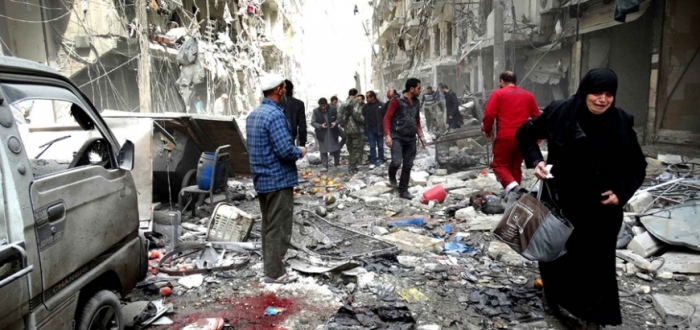The city of Aleppo in northern Syria is enduring a severe humanitarian situation with the entry into its 18th day of siege as an increase in the tempo of bombardment on the residential districts of the city by regime forces and their allies continues to mount.
Most hospitals in the area have been forced to suspend work while they avoid being targeted by Russian and Syrian government bombardment.
At the start of February, the Assad regime cut off the supply route between the northern Aleppo countryside to the eastern districts of the city, which are under opposition control, after a heavy assault with Russian air support. These forces returned two weeks ago to cut off the strategic Castello Road, northwest of the city, placing the opposition-held areas completely under siege.
Aleppo, which is described as the “most dangerous city in the world” according to observers, has become more perilous than at any other time. The bombardment, which has been continuous for over four years, has witnessed its heaviest phase, inflicting death and destruction in all of its districts. The siege which the regime forces imposed on the city after cutting the one supply route (the Castello Road) has made transporting foodstuffs into the area impossible, while the remaining hospitals suffer from a lack of medicine, equipment, and medical staff, alongside a fear of bombing which threatens them at every moment.
According to Dr. Abdel Bassat Ibrahim, Aleppo health administrator for the Syrian opposition, the scope of treatment in opposition-held areas of the city has become very narrow, after four hospitals simultaneously stopped service two days ago when they were hit by bombardment, indication that the health burden for the city as a whole is borne by the three remaining hospitals. Ibrahim said that the hospitals which have stopped work were Al-Daqaq, Al-Hakeem Children’s Hospital, Al-Beyyan Surgery, and Al-Saida Al-Zahara for Gynecology, in addition to the blood bank halting work because it suffered heavy damage during more than one bombing. He added that a few days ago the regime and allied Russian warplanes had targeted the Sharia Medicine center which also went out of service after six of its medical staff were wounded.
Ibrahim said that the rebuilding the hospitals “was not an easy thing”, especially the Al-Beyyan hospital, which was seriously damaged. He expressed his sorrow at the world’s indifference to what was occurring in the city, saying the situation was “unbearable and could not be expressed in words.”
Ibrahim noted that the number of medical staff in the city did not exceed 30 doctors, adding that, “This small number is not enough for the massive volume of work demanded of them as a result of the continuous bombardment on the city.”
He added that there were medical specialties that were highly important but were absent in the city, such as neurological and thoracic surgery. Many medical staff had been forced to treat specific cases without having the specialty knowledge. He added that a specialty in neurological diseases was elusive and that no one could compensate for it.
Bashar al-Hallawi, a spokesman for the opposition Aleppo local council, said that the humanitarian situation in the city was growing worse with the continuation of siege, and that regime forces had cut off the city’s lifeline for 18 days.
Hallawi said that the stores of flour and “staple” foods were not enough for more than three months maximum, adding that this length of time was already subject to heavy rationing.
He said that there was a large increase in prices – by about 40 percent – since the siege began, especially of basic goods such as fuel, flour and food supplies.
This article was translated and edited by The Syrian Observer. Responsibility for the information and views set out in this article lies entirely with the author.


